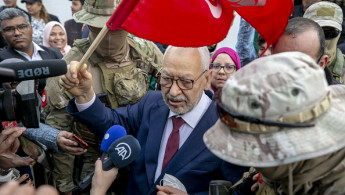Tunisia's President Kais Saied is 'face of counter-revolution', says Ennahda's Ghannouchi
Ennahda leader Rached Ghannouchi has called Tunisian President Kais Saied "the face of the counter-revolution" in an explosive interview with The New Arab's sister site, Al-Araby Al-Jadeed.
The key opposition figure made his scathing comments just days before a scheduled referendum on Saied’s new draft constitution, which has been described as an "illegal, unconstitutional process that aims to legitimise a coup d’etat".
"Today, Tunisians are not seeing genuine democracy. Instead, we are witnessing an underhand campaign. The upcoming referendum has no legitimacy with the Tunisian people," Ghannouchi said.
Saied issued a decree in late May, calling voters to a snap referendum on a new constitution on 25 July. He has ignored the opposition's calls to reverse the controversial move.
Facing down dictatorship
President Saied has embarked on a swift and bitter purge of Tunisia’s judiciary for the past year, sacking dozens of judges and appointing a completely new electoral commission.
Tunisia's main political parties, including Ennahda, have all pledged to boycott the unilateral restructuring of the country's politics.
"We are being faced with a constitution which bears no essence of modern democratic thought, or shred of balance between executive powers that can hold each other accountable," said Ghannouchi, who was speaker of the Tunisian parliament before it was disbanded under Saied’s state of emergency in 2021.
The Ennahda leader told Al-Araby Al-Jadeed that his support for Saied in the 2019 presidential elections had been a grave error.
"While it was well-intentioned, in politics, intentions are not good enough. We made the wrong decision," he confessed.
"The president is legitimising violence, laying the groundwork for civil conflict and dividing Tunisians," Ghannouchi said of Saied’s recent actions.
The institutions of democracy
Ghannouchi said resisting the dictatorship is currently "the absolute priority".
“The steadfastness of judges protesting against Saied is currently the greatest guarantee for the defence of democracy in human rights," he said.
"Thanks to them and other state institutions, we do not fear for Tunisian democracy."
Ghannouchi renewed his call for unrestricted dialogue, noting that "if Saied refuses to engage, as I expect, we must have the conversation without him".
The Ennahda chief said he has been in conversation with key players across the political spectrum to facilitate open dialogue.
"I am ready to give up anything to save democracy," pledged the opposition leader, arguing that while Tunisian democracy may have been damaged, it is yet to be dealt a fatal blow.
Asked about the risk he was putting himself in as an opposition leader, Ghannouchi said: "Everything is possible when you live under a dictatorship - nothing can be ruled out."
"But we believe in the ten years of real freedom and democracy that Tunisia has lived through - as good as freedoms enjoyed across the western world - and we believe that Tunisians will not give up on that," he concluded.





 Follow the Middle East's top stories in English at The New Arab on Google News
Follow the Middle East's top stories in English at The New Arab on Google News
![Israeli forces ordered bombed Gaza's Jabalia, ordering residents to leave [Getty]](/sites/default/files/styles/image_330x185/public/2176418030.jpeg?h=a5f2f23a&itok=_YGZaP1z)

